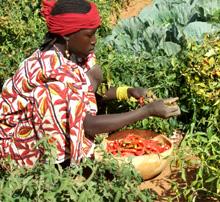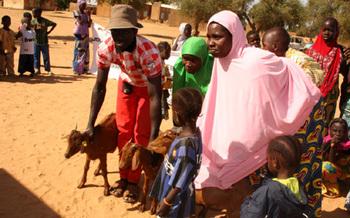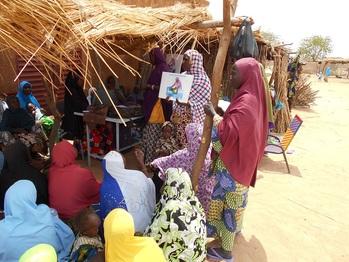Context
The food security situation in Niger remains precarious. Agricultural production is frequently hampered either by the absence of rain or by extreme variations in rainfall patterns linked to climatic changes. This leads to supply bottlenecks, food shortages and undernourishment. The situation is made worse by insufficient knowledge about nutritional requirements.
One of the regions affected is Tillabéri. Children and women during pregnancy, childbirth and while breastfeeding are particularly at risk. Early childhood undernourishment leads to irreparable impairment of development and a high level of child mortality.
Most of the population is currently unable to independently meet its food needs throughout the year and to reduce undernourishment among children. Furthermore, the people lack reliable access to advice on healthcare and on crop and livestock farming.
Objective
Food security has improved for households with vulnerable individuals, particularly women of reproductive age and infants up to the age of two.
Approach
The project primarily promotes the health, agriculture and livestock sectors in ten communities and their health centres.
It is developing the capacity of governmental and non-governmental actors in the health sector to prevent and treat both undernourishment and malnutrition. It is also giving women’s self-help groups at village level the skills they need to monitor children’s development, pass on nutritional advice to other women and treat moderate levels of undernourishment where required.
The project promotes appropriate crop and livestock farming methods in order to improve the yield and diversity of locally produced foodstuffs and increase food supplies. At the same time, it supports income-generating measures with a view to increasing people’s income and therefore improving access to food.
It is cooperating with the German aid organisation Welthungerhilfe in order to harness the regional experience of the two organisations more effectively.
Results
To date, the project has helped renovate and equip 14 health centres and has provided training for health care staff and local decision-makers on the prevention of undernourishment and malnutrition.
A total of 37 women’s groups with 1,433 members attend regular training sessions on topics such as how to prevent and treat mild cases of undernourishment. The women act as multipliers, passing on what they have learned to others. As a result, there is a much greater general awareness of nutritional requirements. According to the women themselves, there has been an improvement in their children’s development.
In 2016, 720 households involved in crop and livestock production were given better-quality seeds. The result was a considerable improvement in yields and an increase in food supplies. In 2017, better-quality seeds were made available to a further 650 households, and around 6,000 households were given advice on better crop-growing methods. As a result of the project’s support for vegetable growing in 34 community gardens, the families now benefit from an additional source of income as well as a greater variety of food and a more balanced diet.


